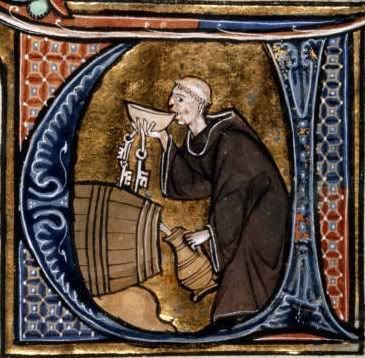Nostalgia always brings with it a certain amount of selective memory. We idealise the past because we remember the best and forget the rest. But is this really such a bad thing? The 19th century medieval popularised by William Morris and the Pre-Raphaelites was based in the firm belief that the people of the Middle Ages had closer contact with organic elements and were thus more aware of their connection with nature and with each other. William Morris' novel News from Nowhere--(which I highly recommend, by the way)--presents a Utopian vision of the future that clearly is meant to be a recreation of an idealised medieval past.
The Nostalgic Middle Ages: 
Of course, medieval revival is fairly easy to criticise from a historical viewpoint. Morris, like his Pre-Raphaelite friends, had a habit of focusing on the positive, and carefully avoiding things like war, feudalism, disease and famine that were such problems throughout the Middle Ages (plus, many of their notions of the Middle Ages were completely inaccurate).
Morris believed capitalism was to blame for modernity's rift with nature, and that our goods-focused society created artificial needs that enslaved mankind in an endless cycle of consumption and debt (no doubt today's current market crisis would have reinforced this belief!). And while the Middle Ages were not perfect, that doesn't mean that we can't embrace what they seem to have done right. Or, perhaps we might finally acknowledge the fact that our imagined concept of the Middle Ages is actually far superior to the way things actually were! I actually think fantasy makes a much better template for the future than any reality, past or present. This is probably because I'm a historian, so I know just how much of a failure most societies have been!
The real Middle Ages? 
I'm curious to see whether the current economic upheaval will cause people to re-evaluate the Middle Ages and look to them for inspiration. I've noticed that some aspects of medieval culture, like the barter system, as the New York Times reports, are actually becoming much more widely adopted (it is expected that barter will account for $3 billion in trade in the US this year).
It will be interesting to see what develops!
Images courtesy Wikimedia. Top: Lamia (1905) by John William Waterhouse; Middle: A monk-cellarer tasting wine from a barrel whilst filling a jug. From Li Livres dou Santé by Aldobrandino of Siena - France, late 13th century.
Thursday, November 20, 2008
La Vie en Rose: The Middle Ages through Rose-Coloured Glasses
Posted by
Margaret
at
2:11 PM
![]()
![]()
Labels: medieval, news, pre-raphaelites, william morris
Subscribe to:
Post Comments (Atom)


14 comments:
It seems that once the problems of a certain society begin to really manifest themselves, the particularly indefensible sort of romantics begin inventing idealized versions of previous societies to address the problems they see. It persists today: just look at the nonsense that Steampunks say about how wonderful the 19th century was... the same 19th century that William Morris and Albert Robida were inventing wonderful Middle Ages in reaction against.
I don't know that I would be able to define it clearly, but it seems to me that the practical sort of Romantic isn't looking wistfully on the past to escape the present day. Rather, it's an exercise in building strength on strength by recognizing the nobler things of the past so as to integrate them with the nobler things of the present.
Of course the past had good things about it. To deny that any age is a mixed bag of good and bad would be to deny that there are any redeeming features of our own day in light of its grotesque evils. Sure there may be wars of aggression and late-stage consumer capitalism, but women have the vote, healthcare is universal and gays can get married.
I'd say that a true Romantic has to be even more cognizant of these distinctions. Just as it's too easy to turn the past into a utopian fiction, so too is it easy to turn it into a dystopian one. One has to be able to give a mature assessment and be able to separate the Julian of Norwiches from the Tomás de Torquemadas (and the good from bad in each of them). I don't think that true Romanticism has to give up on nuance, but rather thrives on it.
I've come to realise recently how ridiculous a monetary system is. It's not even backed up by a gold standard anymore, so I don't know how we're assigning value to our linen/paper bills. Barter and trade makes much more sense in most areas.
Maybe I'm just pessimistic because these mysterious green bills seem to elude me more often than not.
It will indeed be interesting to see what develops, I am sure we are all fed up with the throw away society and people are looking for more durable goods." Hand made" is certainly enjoying a renaissance.
It will also be interesting to see if the major exhibition which is on at the Royal Academy in London, Byzantium 330-1453 will have on artists and designers. I have my ticket booked!
News From Nowhere is definitely worth re-reading at this point in time! The idea of a Utopian sociey is fetching during the current credit crisis. Hard not wax romantic on former ages being perhaps better living than now. I don't think any age was/is perfect. But looking to the past could help with some of man's current issue. Bartering and trading is an exceptionally fine answer to the current use and throw away mentality. More than ever Simple Living, make-do-and-mend, make your own, grow your own schemes will have more value than ever before. Capitalism and greed have spoiled "western" nations...taking a leaf from the pages of "simpler" times may be the answer to many, many problems faced by humankind right now. Interesting to see what happen...hhhmmm...Oh, thanks so much for stopping by my blog, Margaret! We seemed to have lost each other for a bit! Have a great weekend. :o)
Such great comments from everyone! I think we're all in agreement about romanticising history. However, there is still so much to be gleaned from an examination of the past (both in terms of mankind's triumphs and failures). And I couldn't agree more with Tracy--we could definitely learn some very important lessons from the thriftiness and simplicity of our ancestors.
It still strikes me as funny that the business world is panicking about the fact that holiday sales will be lower. How can business leaders expect people to spend more when they are already in debt up to their eyeballs!? I thought debt was the problem, and here they are trying to encourage people to spend more, just like how the US Government was frustrated that people used their economic stimulus checks to pay off their debt, rather than spend more. And yes, I do get the fact that lower sales will mean that a lot of people will lose their jobs, which is horrible, but the government is still definitely sending mixed messages!
Always thought provoking Margaret. Thank you! It will be interesting to see what develops. That is a huge amount of money bartered. I had no idea that this was happening on such a wide scale.
Wishing you and your family a very Happy Thanksgiving!
Nancy
I think romanticising history is useful as it can provide something to aspire to.
I know as a crafter that I am about to forgo most things to get my Christmas crafting for family and friends done in the next few weeks. There isn't anything romantic about it. But this is my choice to work like this and get satisfaction from my work. I think Morris would approve of that aspect. I'm not sure he ws realistic about the number of hours an artisan would need to puyt in to be able to live from their work. perhaps that is why A+C things were usually only afforded by the wealthy?
The interesting thing I find about the growing "Maker"/crafter/DIY culture is that it is pretty big business. I don't have exact figures on how much money Michael's and Home Depot pull in, but a cursory examination is going to suggest "a bunch."
On the one hand, it demonstrates the adaptability of capitalism and therefore undermines arguments that if the current market changes the world will come to an end. Yes there will be money to be made after the oil industry and the disposable society. On the other, that adaptibility means it's a bloody atomic mutant cockroach we'll never get rid of. At least the trajectory right now is going back to the idea that money represents something of real value, like people-hours or rare materials or tangible additions to things (like houses) rather than just abstract numbers.
Yes, DIY is definitely a big business. Just look at all those DIY shows on tv! I think we'll be seeing even more of them now that the economy is in such bad shape.
Capitalism definitley needs to adapt in order to survive. I don't think it's possible for people to keep consuming at the current rate without great damage to our planet and the people in it.
May I heartily congratulate you for such a lovely blog I was searching for Sir Frank Dicksee's Romeo and Juliet and came along your site As I am quite fascinated by the Pre Raphaelites too, please accept my greetings from Greece and I will be a frequent visitor All the best
Pardon me if the name looks all Greek to you My google ID reads Theodoros A.Peppas in english characters, i.e. my name
Thanks you for the comments Theodoros!
Don't expect DIY /barter to remain tax exempt: I know for a fact that in Holland the government was sussing out the possibilities of taxing people doing repairs on their own home.
Not sure if that has been implemented, but it seem a horrendous intrusion.
So much for the present :-)
Back to the distant past.
A most wonderful post!
I definitely fall into the category of those romanticizing the past - more medieval times than Victorian - but I can see the pitfalls of this as history is frequently re-defined. What we think we know and what was, is often vastly different! I wonder if subsistence farming will be a long-term result of the desire to live closer to the land or just a trend?
Post a Comment